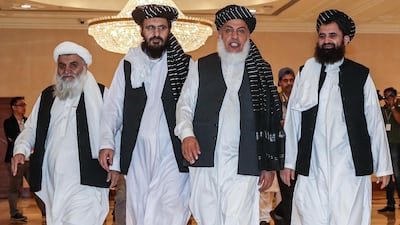The Taliban kidnapped six Afghan journalists working for private and government media organisations in eastern Paktia province, government officials and Taliban said on Saturday.
The reporters, working for radio and TV news companies that broadcast news in the Pashto and Dari languages, were abducted while travelling together from neighbouring Paktika province to Paktia to attend a media workshop on Friday.
"We are trying to negotiate their release with the Taliban," said Abdullah Hasrat, a spokesman for Paktia's governor.
A Taliban spokesman confirmed the abduction of six journalists by their fighters but said they will be released soon.
"Yes, our mujahideens (fighters) have mistakenly kidnapped them," said Zabihullah Mujahid, a spokesman for the hardline insurgent group.
"Right now mobile services are not working, but they will be released as soon as we establish contact with the local commander," he said.
Afghanistan was the deadliest country in the world to be a journalist in 2018, with 13 deaths according to the Committee to Protect Journalists.
The International Federation of Journalists said 16 journalists were killed last year.
In June, the Taliban issued a threat to Afghan media, saying journalists will be targeted unless news outlets stop broadcasting what they describe as government propaganda against the insurgents.
Media organisations were given one week to stop transmitting "anti-Taliban advertisements" by the group's military commission, a warning that was denounced by the Afghan government and western diplomats.
In 2016, a Taliban suicide bomber rammed his car into a bus carrying employees of Tolo TV, the country’s largest private broadcaster, killing seven journalists.
The Taliban said it killed the employees because Tolo was producing propaganda that supported the occupation of Afghanistan by the United States and its allies in their war against the insurgents.
On Saturday, the United States president tweeted that a meeting with the Taliban due to be held on Sunday has been cancelled because of an attack in Kabul on Thursday that killed 12 people, including a US soldier.
The president tweeted that he "called off peace negotiations" and demanded to know who "would kill so many in order to seemingly strengthen their bargaining position" in the negotiations.
The United States and the Taliban were close to finalising a deal to end 18 years of conflict that began after the 2001 invasion of Afghanistan.

